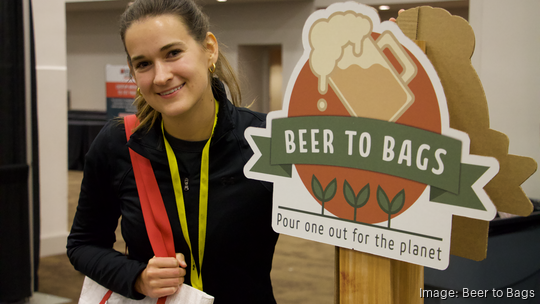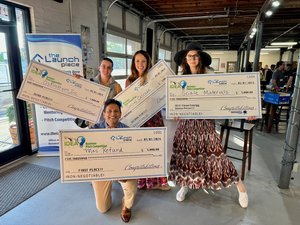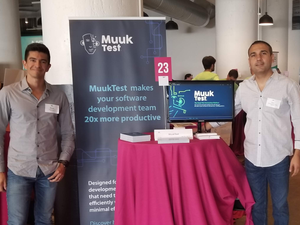
A sustainable startup with Wolfpack roots has been acquired by an Oregon company.
Beer to Bags, a Raleigh startup that uses breweries’ throw-away malt bags and turns them into customized beer tote bags, has been acquired by Oregon-based custom tap manufacturer Hoptown Handles.
Financials were not disclosed.
Founder Emily Neville started Beer to Bags, initially as Reborn Clothing, as a 19-year-old N.C. State University sophomore.
“I just had this passion for taking items that were discarded or had no use in the economy and making them into something that would be alive once more,” she said. Neville had grown up with a sewing machine and a growing interest in sustainability. Reborn allowed her to combine it all to create new products, from upcycling off-brand uniforms for Delta Airlines to working with hundreds of universities recycling athletic jerseys and event t-shirts. And she was taking in materials from the public, making custom t-shirt quilts.
By 2021 she was spread pretty thin. While there were outward signs of success – a team, a cut-and-sew facility, a materials warehouse, and at one point a North Hills storefront – Reborn was not profitable.
“There wasn’t really a focus for scale and growth," Neville said.
That’s when Raleigh Brewing Company reached out. The beer maker was throwing away 200 malt bags a week. Could Reborn use them?
So many readily available materials led to an epiphany – one that would eventually change the course of the company. Reborn downsized, exiting its leases – including those for the cut-and-sew facility and the warehouse in favor of an outside contract manufacturer (that it still uses today). It reduced its staff. And it went all in on creating durable tote bags and other products from materials breweries were discarding, rebranding as Beer to Bags.
The company went lean – so lean that by the time Hoptown Handles and its branded merchandise arm, Shore Up Supply, came calling, Neville, who by this point had taken on multiple gigs at area startups such as Blue Recruit and PeopleLogic to pay the bills, was its only employee.
The conversations with Hoptown Handles started in January.
Neville realized the company was at yet another pivot point. In order to scale, it needed a bigger reseller. Hoptown Handles could be that reseller. And the firm also offered more personal stability, as Neville is taking on a full-time role as Shore Up Supply as its director of business development, staying in Raleigh and working remotely.
Neville said there’s a lot of common ground for startups like hers right now: a tough funding market that requires even tougher decisions.
“You need to be prepared right now to weather the storm,” she said. “I’ve really become an advocate for staying lean and staying on top of your cash flow, doing what you can with what you have. Unless you’re willing to take that lower valuation… You probably need to be prepared to do with what you have.”
Companies are finding they need to be larger and generate profits to raise the big rounds, Neville said.
The future is bright for Beer to Bags, she said. Right now, it’s working with its outside manufacturers on order volumes in the thousands per month. Under its new owner, she expects it to scale.
According to Beer to Bags, since 2021 it has diverted more than 10,000 malt bags from the landfill, turning them into tote bags that have been sold in more than 200 breweries and taprooms to date.

